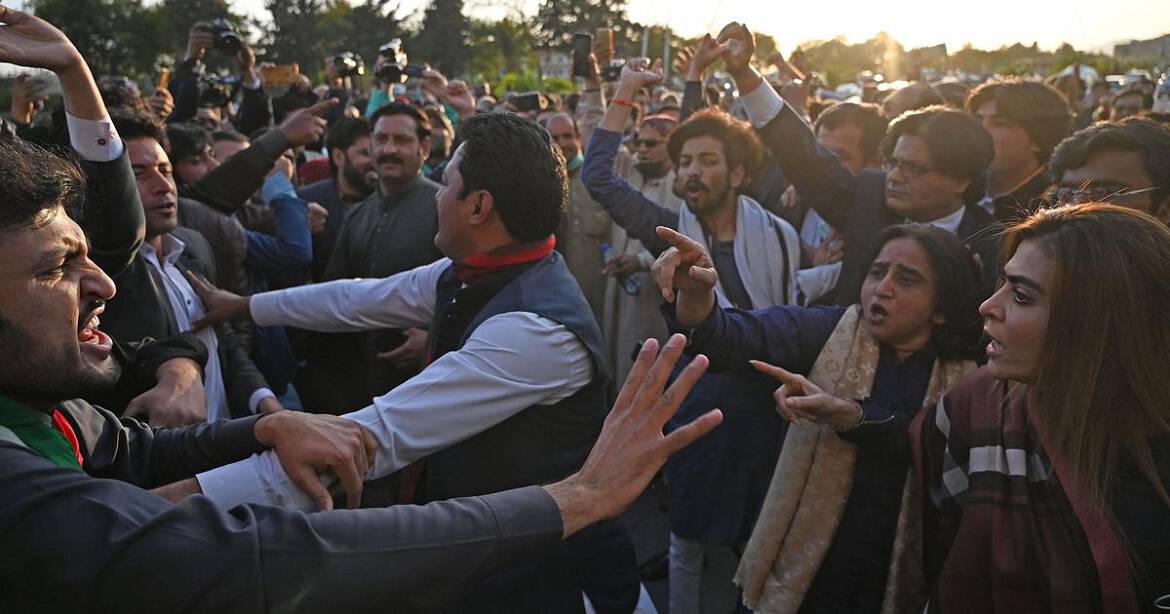By Rana Danish Nisar
Political polarization refers to the increasing divergence of political attitudes and beliefs among individuals or groups. This can manifest in a variety of ways, including differences in ideology, values, policy preferences, and voting behavior.

Polarization is often characterized by a growing sense of ideological distance between different groups, leading to increased animosity, distrust, and even hostility. In some cases, polarization can be fueled by factors such as social media, partisan media outlets, and political campaigns that emphasize divisive issues or demonize opponents. Polarization can have significant consequences for democracy, making it harder to find common ground and compromise on important policy issues.
National security refers to the protection of a nation’s citizens, territory, and interests from internal and external threats. This includes safeguarding against physical, political, economic, and environmental dangers that could harm a nation’s security. National security concerns often include issues such as military defense, intelligence gathering, law enforcement, border control, cyber-security, and the protection of critical infrastructure. It also involves ensuring the stability and resilience of the government, economy, and society as a whole. The concept of national security is highly complex and multifaceted, and its definition can vary depending on the particular country, political context, and historical circumstances. Ultimately, the goal of national security is to protect a nation’s people, assets, and values, while promoting peace, stability, and prosperity.
National security and political polarization can have a complex and interconnected relationship. On one hand, political polarization can threaten national security by creating divisions within a country that make it difficult for leaders to effectively address external threats. If politicians and citizens are deeply divided on important issues, such as foreign policy or defense spending, it can be difficult to build consensus and take decisive action in the face of a security threat. Additionally, if political polarization leads to violence or civil unrest, this can also threaten national security by destabilizing the country and making it more vulnerable to external threats. On the other hand, national security concerns can also contribute to political polarization. For example, if a government’s response to a security threat is seen as overly aggressive or authoritarian, this can fuel public distrust and resentment toward the government, which can exacerbate existing political divisions. Similarly, debates over how best to balance security and civil liberties can be highly divisive, with different political factions holding strongly opposing views. In summary, the relationship between national security and political polarization can be complex and multifaceted. While polarization can threaten national security by creating divisions and hindering effective decision-making, national security concerns can also contribute to polarization by fueling public distrust and disagreements over policy decisions.
Political polarization and national security are two issues that are intertwined and have significant impacts on the stability and security of a nation. Political polarization refers to the increasing ideological divide between political parties and individuals, resulting in a lack of consensus and compromise in policymaking. This can lead to increased political gridlock, decreased governmental effectiveness, and weakened national security. In this article, we will explore the relationship between political polarization and national security, the challenges posed by political polarization, and potential solutions to mitigate its impact.
Political polarization can have severe implications for national security, as it weakens the ability of government agencies to respond effectively to threats. Polarized political parties are less likely to cooperate and compromise, resulting in policy stalemates that leave the country vulnerable to external threats. Additionally, political polarization can lead to a lack of trust in government institutions and officials, which can undermine the legitimacy of national security policies and the government’s ability to implement them.
One of the most significant threats posed by political polarization to national security is the rise of authoritarianism. As polarization increases, there is a greater likelihood of extremist political factions seizing power, resulting in a decrease in civil liberties, human rights abuses, and a lack of accountability in government. Authoritarian regimes are often more aggressive and confrontational in their foreign policies, which can lead to international conflict and instability. Another challenge posed by political polarization is the impact on intelligence and law enforcement agencies. The politicization of these agencies can result in a lack of trust in their activities and a decrease in their effectiveness. This can make it difficult to detect and prevent threats, including terrorism and cyber-attacks.
One of the main challenges posed by political polarization is the decrease in the ability of the government to respond effectively to crises. When political parties are polarized, it becomes difficult to reach consensus on critical issues, resulting in delays in policy implementation and a lack of coherence in the government’s response. This can be particularly problematic in the case of national security threats, where timely and effective responses are crucial. Another challenge is the erosion of trust in government institutions and officials. Political polarization often leads to a lack of faith in the government’s ability to address issues and protect citizens. This can lead to a decrease in support for national security policies and a lack of cooperation with government agencies. Political polarization can also have an impact on the international reputation of a nation. When political factions are in conflict, it can create a perception of instability and uncertainty, which can discourage foreign investment and make it difficult to establish diplomatic relationships. This can weaken the country’s ability to cooperate with other nations on issues related to national security.
There are several potential solutions to mitigate the impact of political polarization on national security. One approach is to promote a culture of compromise and collaboration. This can be done by incentivizing political parties to work together and rewarding compromise rather than ideological purity. Additionally, it is essential to establish trust in government institutions by ensuring transparency and accountability in government activities. Another solution is to promote civic education and engagement. This can help to ensure that citizens are informed about national security issues and the importance of cooperation with government agencies. Educating citizens about the consequences of political polarization can also help to reduce support for extremist political factions and promote a more moderate political climate. It is crucial to establish a strong and independent judiciary to prevent the politicization of law enforcement and intelligence agencies. The judiciary can act as a check on government overreach and ensure that agencies are held accountable for their actions.
Pakistan has been facing political polarization for decades, which has posed a significant challenge to its national security. Political polarization refers to the increasing division and hostility between different political groups or parties in a country. In the case of Pakistan, this polarization has been between the two major political parties, the Pakistan Muslim League-Nawaz (PML-N) and the Pakistan Tehreek-e-Insaf (PTI). This political polarization has become increasingly evident in recent years, with the 2018 general elections being one of the most divisive in Pakistan’s history. The election was marred by allegations of rigging and manipulation, which led to protests and clashes between supporters of the PML-N and PTI. This polarization has also led to a breakdown in communication and cooperation between the government and opposition parties, hindering the government’s ability to address national security challenges.
One of the main ways in which political polarization can challenge Pakistan’s national security is through the weakening of democratic institutions. In a polarized political environment, politicians and political parties are more likely to prioritize their own interests over the greater good of the country. This can lead to a breakdown in the rule of law, corruption, and a lack of accountability. In the long term, this can undermine the legitimacy of democratic institutions and erode public trust in the government. This, in turn, can make it easier for non-state actors, such as terrorist groups, to gain support and recruit new members. Political polarization can also exacerbate existing security threats in Pakistan. For example, Pakistan is facing a significant threat from terrorism, with several terrorist groups operating within its borders. These groups often exploit political divisions and weaknesses to carry out their attacks. A polarized political environment can make it easier for these groups to infiltrate and influence political parties or to exploit the lack of coordination and cooperation between different government agencies. Moreover, political polarization can also make it difficult for the government to implement effective policies to address national security challenges. In a polarized environment, politicians and political parties may be more concerned with scoring political points and attacking their opponents than with finding solutions to pressing issues such as terrorism or regional security. This can lead to a lack of consensus on key policy issues, hindering the government’s ability to make timely and effective decisions.
Furthermore, political polarization can also have a negative impact on Pakistan’s international relations and image. A polarized political environment can make it difficult for Pakistan to present a united front to the international community, undermining its credibility and ability to engage in effective diplomacy. This can also make it harder for Pakistan to attract foreign investment and support, which can have a detrimental effect on its economy and, by extension, its national security.
To address the challenge of political polarization in Pakistan, several steps can be taken. One key step is to promote greater dialogue and cooperation between political parties and leaders. This can involve creating forums for discussion and debate, such as parliamentary committees or national conferences, where politicians from different parties can come together to discuss pressing issues and find common ground. Additionally, efforts can be made to strengthen democratic institutions and promote accountability and transparency. This can involve strengthening the independence of the judiciary, promoting the rule of law, and cracking down on corruption. These measures can help to restore public trust in democratic institutions and reduce the influence of non-state actors on the political process. Furthermore, the government can take steps to address the root causes of political polarization, such as inequality and economic insecurity. By promoting greater economic opportunities and social mobility, the government can reduce the appeal of extremist and populist political movements that often thrive in polarized environments.
In conclusion, political polarization in Pakistan poses a significant challenge to its national security. It can undermine democratic institutions, exacerbate existing security threats, hinder effective policy making, and damage Pakistan’s international image. To address this challenge, efforts must be made. Political polarization is a significant challenge facing many nations today. The increasing divide between political factions can have severe implications for national security, resulting in decreased governmental effectiveness and a weakened ability to respond to external
Author: Rana Danish Nisar – The author holds high academic credentials in the field of international relations. He has deep expertise in security, defense and military studies.
(The views expressed in this article belong only to the author and do not necessarily reflect the views of World Geostrategic Insights)
Image Credit: Reuters
You might also like
Political Polarization in Pakistan |








